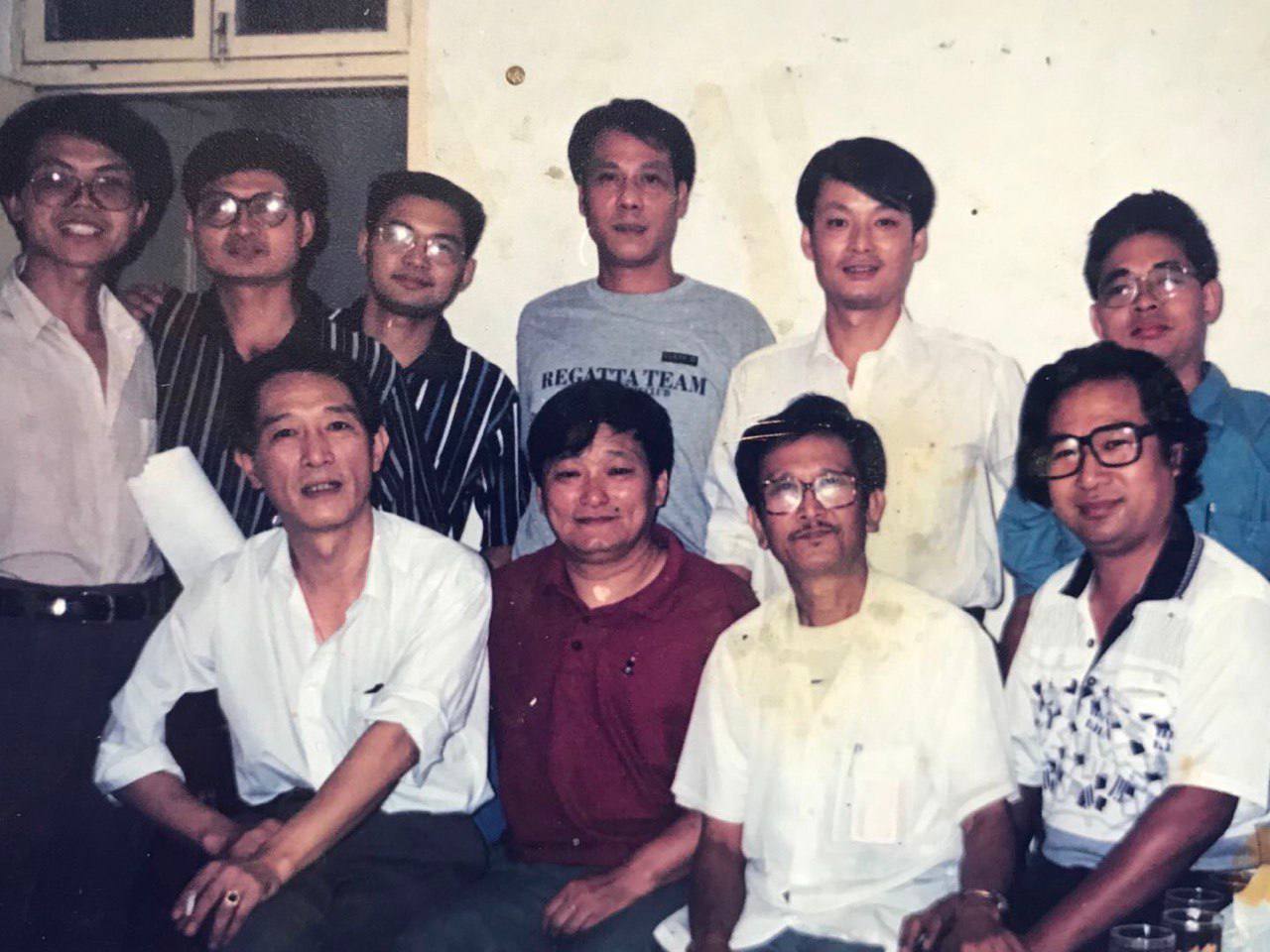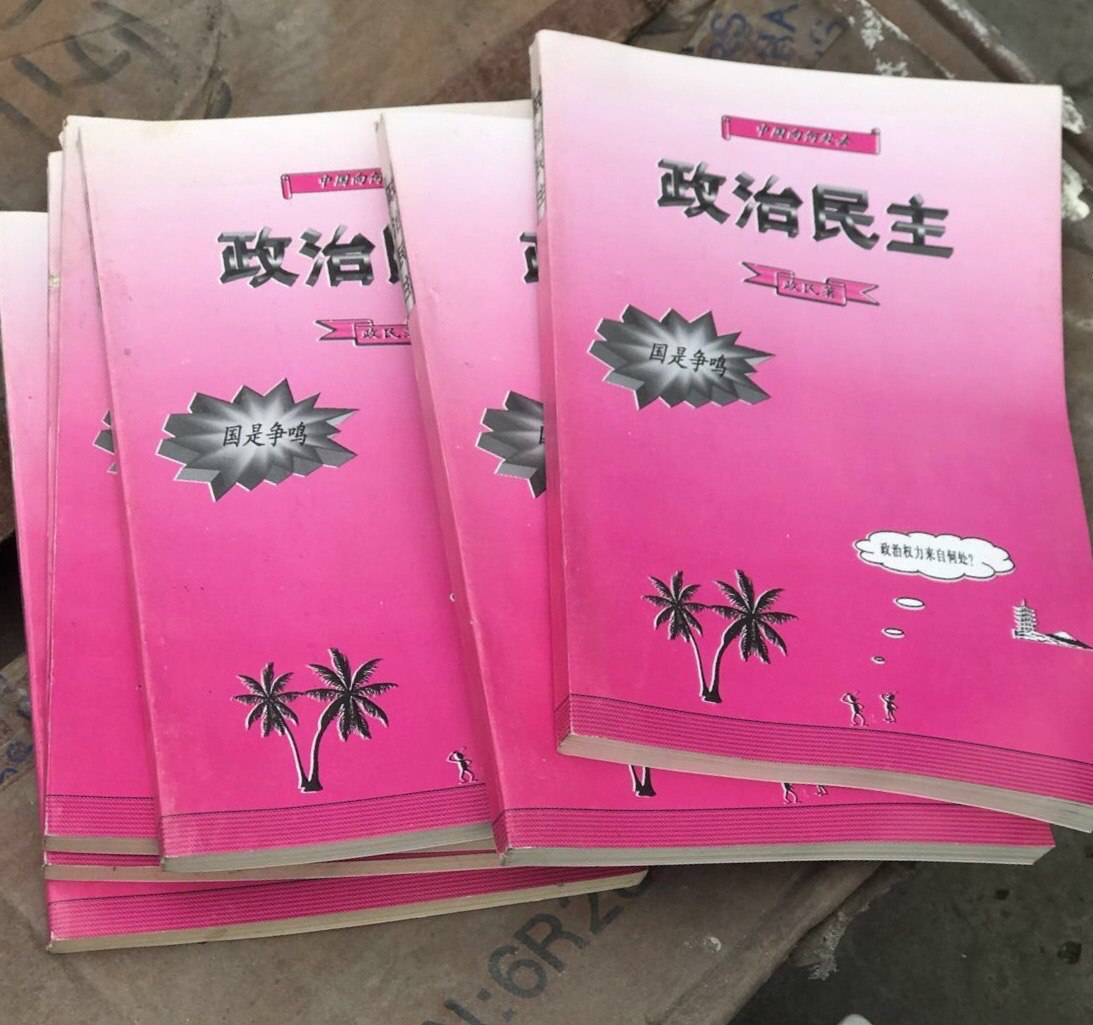The Origins of the Democratic Party (Part 4): The Democratic Party Moves Toward Grassroots Politics
作者:朱虞夫 编辑:胡丽莉 责任编辑:罗志飞 鲁慧文
我只手空拳,无法施展,想到了民主墙时期的老朋友毛庆祥、王荣清、李锡安,八九六四,我因为“参与动乱”被抓(收容审查二十七天),随即被江干区房管局解除工会负责人职务,逐出机关,下放基层,病休在家,恰好毛庆祥开在清泰立交桥下的化工原料店歇业,在与陈维健、张震毅商量后邀我去开照相馆,他自己在温州做生意,经常两头跑。他家离我住的地方很近,相距不到一百米。我听说他回家了就去找他,他回家也会第一时间来我家聊聊。组党的事我也每次都对他说起。那天我又讲了民主党的事,现在正缺人手,希望他能把温州的生意结了,回杭州来,毛庆祥很爽快地一口答应,就回温州去清理转让业务了。

1998年10月,浙江筹委会初创时期接待外地朋友,左起前排:王荣清、王东海、邓焕武、朱虞夫,后排:吴义龙、毛庆祥、王培剑、姚遵宪、傅升、祝正明
王荣清的家已经从建国北路搬到离我不远的采荷新村,也就是一里地左右,他在家附近经营一家洗头店,79年民主墙时期的几个老朋友时而去他那里叙叙旧。李锡安住在望江门,经营过自行车和锁具生意,均不如意,王荣清在自己的门店附近帮他盘下一间洗头店,我这里搞民主党正缺人,就去一个一个请他们出来共襄义举。
祝正明写了一本《民主政治》的书,经济本不宽裕的他希望圈内的朋友能帮助他回流一些款项,并以文会友,结交更多志同道合的朋友。我带他见陈立群——她是二十年来杭州最活跃的社会活动家之一。她在杭州民运圈的人缘不错,在组党过程中我很希望她能与我们一起努力,便约了祝正明一起去她家动员她出山。祝正明带上十本《政治民主》,与我到卖鱼桥立群的家,我给他们二人互相作了介绍后,立群买下了这十本书。但是,对于我们邀请她参加民主党的事,她非常遗憾地说,她明天就要启程去多米尼加了。这一别就是许多年。

我想起民主墙时期有勇有谋的方醒华,在问到他的电话后,向他要了地址,就与祝正明一起去他萧山的厂里动员他出山。方经营着一个制作市政工程人行道地砖的工厂,原料就是隔壁萧山(火)电厂烧剩的废渣,他的办公室里坐着一个陌生人,自始至终抽着烟一言不发。方婉言拒绝了我们,说他的心是与我们一起的,但是他的工作很忙,不能参加。其时,我心里已经怀疑那个陌生人是他叫来的萧山政保,直到我被逮捕的那天才证实。那天杭州市政保押送我去老东岳看守所,一个戴墨镜的便衣在车上对我说,你这样做害了你的伢儿,你看方醒华就比你聪明,他为了儿子能去省检察院工作,答应我们,永远不搞民运了。
我因为在秋涛宾馆突然病倒,与王东海差不多时间放出来了,王有才和祝正明又关了些日子。出来后,趁着中共没有取缔中国民主党,大家都觉得不能自我放弃。同时在城隍山和湖滨一公园有许多关心时事的人也通过“美国之音”播报的新闻,知道了杭州组建中国民主党的事略,大家聚在一起议论纷纷。渐渐有几个比较活跃的市民大胆地发表自己的见解,引起上城区政保科张建华和郑刚的注意。
那几天,市民来金彪每天都在湖滨一公园用普通话发表政论,口才滔滔,经常在那一带的李锡安把他带进了我们筹委会的圈子里(同时带来的还有池建伟和李坝根等人)。有人说,湖滨来了一个北京的大学生,这消息传到上城区公安分局政保科,被张建华和郑刚盯上了,他们潜匿在公园出口处附近的灌木丛后面,当来金彪走出公园的时候,他俩猛扑上前,架住来金彪就往车里塞。正巧被人看到,来马上告诉池建伟,池了解到来金彪被关在南星派出所,急急忙忙找来我家。因为南星派出所在我工作的南星房管站隔壁,平时他们有文案都来找我帮忙,我立即赶过去探视。来金彪家里只有一个老母亲,他怕母亲着急,希望我能去报个信。我叫上复兴北苑社区的治保主任祝德胜一起过去了,看到他家境十分贫困,我向治保主任借了二百元钱,交给他母亲,安抚她,待她情绪稳定下来,再回派出所隔着铁栏杆聊天,七点正,我把随身携带的收音机调到“美国之音”频道,把国际新闻中来金彪被抓的新闻放给他听,门口值班的那个警察也感到不可思议。
第二天,我遇到张建华,问他来金彪的事,张大呼上当。他说,他们接到“耳目”(线人)说湖滨有个北京来的大学生在演讲,他们悄悄去听了,估计这个人是“徐文立”,就把他抓起来,到湖滨派出所做笔录,这个人说自己名字是来金彪,问他哪里人,他说是南星桥的。
原以为抓到了一条大鱼,结果大失所望,张建华和郑刚的沮丧可想而知。
毛庆祥、王荣清、李锡安络续各自担负起各方面的工作。吴义龙与他女友单称峰没有住处,毛庆祥找到戚惠民,让戚惠民把自己在景芳一区的一套房子无偿借给这对热恋中的年轻人居住,同时戚惠民这个民主墙时期的老战友也来为羽毛未丰的民主党做些实务,毛庆祥又发挥他在民主墙时期办理民刊的特长,编辑、发行了《在野党》。更重要的是,毛庆祥找来了当年民主墙时期的老战士聂敏之,当民主党的各位干将被捕入狱后,面对群龙无首的局面,聂敏之当仁不让地站出来担当重任,继续带领大家艰苦卓绝地奋战(聂敏之最后被捕并判刑,在服刑期间去世,成为中国民主党的第一个殉道者)。各地的民运朋友纷纷前来杭州,王荣清的家就成为接待大家的地方,由于他经商多年,经济比较宽裕,凡是来杭的各地民运朋友,他往往有所接济;李锡安经常在市民活跃的地方走动,把有意加入民主党的新人带来圈内,当时像李巴根、池建伟、萧利彬、高天佑、苏元贞、来金彪、王富华、吴远明等都是他带来的,这些新人又陆陆续续带来其他人,杭州的民主党活动蒸蒸日上。
The Origins of the Democratic Party (Part 4): The Democratic Party Moves Toward Grassroots Politics
By Zhu Yufu | Edited by Hu Lili | Chief Editors: Luo Zhifei, Lu Huiwen Translator: Lu Huiwen
Empty-handed and powerless, I thought of my old friends from the Democracy Wall era—Mao Qingxiang, Wang Rongqing, and Li Xian. During the 1989 Tiananmen protests, I was arrested for “participating in the turmoil” and held in custody for 27 days. Soon after, I was removed from my position as union leader at the Jianggan District Housing Bureau, expelled from the agency, and relegated to grassroots work. I later went on sick leave and stayed home. At that time, Mao Qingxiang’s chemical material store under the Qingtai Overpass had just closed. After consulting with Chen Weijian and Zhang Zhenyi, he invited me to open a photo studio. Mao was running a business in Wenzhou and frequently traveled between there and Hangzhou. His home was very close to mine—less than 100 meters away. Whenever I heard he was home, I’d go visit him, and he’d often come to chat with me first thing upon returning. I talked to him about the founding of the Democratic Party every time. One day, I told him again that we lacked manpower and hoped he could wrap up his business in Wenzhou and return to Hangzhou. He readily agreed and soon went back to Wenzhou to handle the transfer.

In October 1998, in the formative period of the Zhejiang Preparatory Committee, members received friends from outside the province. From left to right — front row: Wang Rongqing, Wang Donghai, Deng Huanwu, Zhu Yufu; back row: Wu Yilong, Mao Qingxiang, Wang Peijian, Yao Zunxian, Fu Sheng, Zhu Zhengming.
Wang Rongqing had moved from Jianguo North Road to Caihe New Village, which was only about a mile from my place. He ran a small hair salon nearby. A few old friends from the 1979 Democracy Wall period would occasionally drop by to reminisce. Li Xian lived in Wangjiangmen. He had tried his hand at bicycle and lock businesses, both unsuccessfully. Wang helped him set up a hair salon near his own shop. As I was organizing the Democratic Party, I approached them one by one, inviting them to join this collective cause.
Zhu Zhengming had written a book titled Democratic Politics. Financially strapped, he hoped friends in the circle would help recoup some costs and also use the book to make connections with like-minded people. I introduced him to Chen Liqun, one of the most active civil society figures in Hangzhou over the past two decades. She had strong connections in the local democracy movement, and I really hoped she would join us. Zhu brought ten copies of his book, and together we visited Chen’s home near Maifuyu Bridge. After introducing them, Chen bought all ten books. However, when we invited her to participate in the Democratic Party, she regretfully declined, saying she was leaving for the Dominican Republic the next day. That farewell lasted for many years.

I remembered the clever and courageous Fang Xinghua from the Democracy Wall days. After getting his phone number and address, I went with Zhu Zhengming to his tile factory in Xiaoshan to persuade him to return. Fang was running a business making sidewalk tiles for municipal projects, using leftover slag from the nearby Xiaoshan thermal power plant as raw material. In his office, there was a stranger silently smoking. Fang politely declined, saying his heart was with us, but he was too busy with work to get involved. At the time, I suspected the stranger was from political security. This suspicion was confirmed the day I was arrested. As Hangzhou State Security was escorting me to the Laodongyue Detention Center, a plainclothes officer in sunglasses told me, “What you’re doing is hurting your son. Look at Fang Xinghua—he’s smarter. He agreed to stay away from dissident activities so his son could work at the Provincial Procuratorate.”
Because I collapsed at Qiutao Hotel, I was released around the same time as Wang Donghai. Wang Youcai and Zhu Zhengming remained in custody a few more days. After their release, we knew we couldn’t just give up—especially since the CCP hadn’t yet officially banned the China Democracy Party. Meanwhile, at Chenghuang Hill and Hubin Park, many politically aware citizens had learned of the CDP’s formation in Hangzhou through Voice of America broadcasts. People began gathering to discuss it.
A few active citizens started boldly sharing their views, catching the attention of Zhang Jianhua and Zheng Gang from the Political Security Division of Shangcheng District.
One man named Lai Jinbiao delivered fluent political speeches daily at Hubin Park in Mandarin. Li Xian, who often roamed the area, brought him into our preparatory committee (along with Chi Jianwei, Li Bagen, and others). Someone said a university student from Beijing was giving speeches in Hubin, and this news reached the Political Security Division. Zhang Jianhua and Zheng Gang lay in wait behind bushes near the park exit. As Lai Jinbiao left the park, they sprang out and grabbed him, shoving him into a car. A bystander saw this and quickly informed Chi Jianwei, who learned that Lai was being held at the Nanxing Police Station. He rushed to my house. Since that station was next to my workplace at the Nanxing Housing Office, and its staff often asked me for help drafting documents, I immediately went to check on Lai.
Lai lived only with his elderly mother and didn’t want her to worry. He asked me to inform her. I went with Zhu Desheng, the neighborhood security director from Fuxing North Court. Seeing the family’s dire financial situation, I borrowed 200 yuan from Zhu and gave it to Lai’s mother to comfort her. After she calmed down, I returned to the station and chatted with Lai through the bars. At exactly 7 p.m., I tuned my portable radio to Voice of America and played the news segment reporting Lai Jinbiao’s arrest. Even the guard at the door found it unbelievable.
The next day, I ran into Zhang Jianhua and asked about Lai. Zhang cursed, saying they’d been tricked. He explained that their informant told them a university student from Beijing was giving speeches in Hubin. They listened quietly and assumed it was Xu Wenli, so they arrested him. At the station, the man gave his name as Lai Jinbiao and said he was from Nanxing Bridge. They thought they’d caught a big fish—only to end up disappointed.
As time went on, Mao Qingxiang, Wang Rongqing, and Li Xian each took on specific responsibilities. Wu Yilong and his girlfriend Dan Chengfeng had no place to stay, so Mao asked Qi Huimin to lend them his apartment in Jingfang District for free. Qi, another veteran from the Democracy Wall era, began helping with the early organizational work of the party. Mao also used his publishing skills from those days to edit and distribute Zaiye Dang (The Opposition Party). More importantly, he recruited Nie Minzhi, another veteran of the Democracy Wall movement. When the key party members were arrested and the leadership was decapitated, Nie stepped up without hesitation to lead the movement. He was later arrested, sentenced, and died in prison—becoming the first martyr of the China Democracy Party.
Democracy activists from across the country began coming to Hangzhou. Wang Rongqing’s home became a reception hub. With his years of business experience and financial stability, he often provided assistance to visiting activists. Li Xian frequently moved among politically active citizens, bringing interested newcomers into the circle. People like Li Bagen, Chi Jianwei, Xiao Libin, Gao Tianyou, Su Yuanzhen, Lai Jinbiao, Wang Fuhua, and Wu Yuanming were all introduced by him. These newcomers, in turn, brought in others, and the China Democracy Party’s activities in Hangzhou began to flourish.







谢晶芳-rId5-1280X853.png?w=100&resize=100,70&ssl=1)
